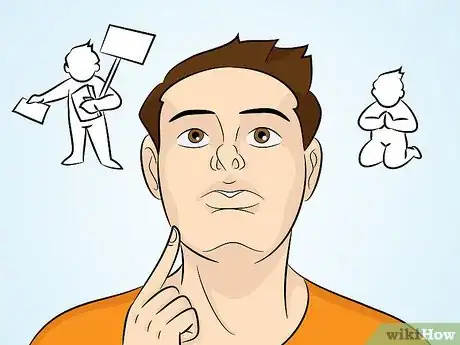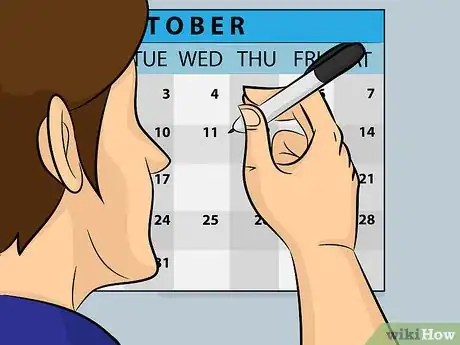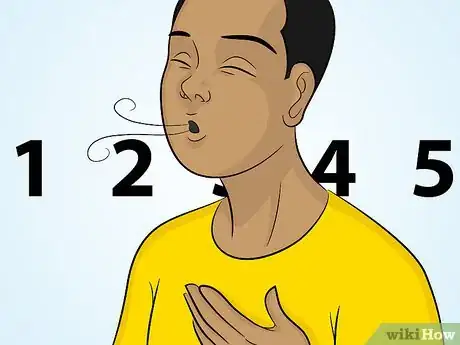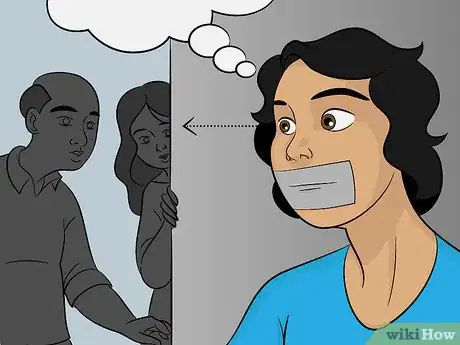This article was co-authored by Trudi Griffin, LPC, MS. Trudi Griffin is a Licensed Professional Counselor in Wisconsin specializing in Addictions and Mental Health. She provides therapy to people who struggle with addictions, mental health, and trauma in community health settings and private practice. She received her MS in Clinical Mental Health Counseling from Marquette University in 2011.
This article has been viewed 29,592 times.
Do you need some time to reflect on your personal needs? Are you mad at your parents for grounding you unfairly? Are you protesting an injustice in the world? These are all reasons that people might choose to stop speaking. In a 2016 study from Frontiers in Psychology, researchers studied the psychological impact of a retreat for people taking a vow of silence. They discovered that the quiet participants felt more balanced, positive, and in control.[1] Imagine what a single day of silence might do for you!
Steps
Planning for Your Day of Silence
-
1Choose what kind of silent day you want. People choose to stay silent for various reasons. Sometimes it is a public social experiment or a political protest. Other times it is meant as a private way to explore oneself through meditation.
- Private days of silence are often conducted in a place of spiritual worship or a retreat. People go to such places to get away from their daily lives. It is meant to help you silently explore your inner self without disruption.[2]
- Public days of silence are not meant to be completed in solitude. A person usually engages in their normal daily activities without speaking. This is often as a form of protest or a way to draw attention to something.[3]
- If you are participating in a political cause, you may hand out a pamphlet that explains the cause.
- If you are not speaking because you are upset with someone like a parent or friend, your silence may make them realize the magnitude of your discontent. Remember, though, that it could also inflame the situation even further.
-
2Pick an average day if you plan to be silent in public. Choose a day when you know you will be interacting with others. This will draw more attention to the fact that you are not speaking.
- If your intention is to participate in a political cause like national Day of Silence, engaging in your normal school or work day is part of the project. Others may be interested or moved by your silence, drawing more attention to your cause.
- If your silence is a social experiment, choosing an average day is best.[4] It may be more interesting to observe the differences between what normally goes on and what happens when you don't speak.
Advertisement -
3Find an appropriate location for a private day without talking. If you want to be by yourself during the day, find a location that is conducive to your needs. Since it is only one day, it might be easiest to stay at home. Alternatively, consider asking a local place of worship or a meditation retreat locale to host you for the day.
-
4Alert the people close to you. Let people know about your choice to stay silent. You don't need to tell everyone, but it will be easier to stay silent if you inform the people you talk to regularly. Tell your spouse, children, parents, co-workers, or teachers before you begin your day without talking.[5]
- If you have important interactions with people like parents or teachers throughout your day, let them know when you plan to be silent so they know what's going on with you.
- If you're staying silent for a day in protest to your parents, telling them beforehand will make the situation less tense and less likely to worsen. Simply tell them when you'll be ready to talk.
- You might say, “Mom, I'm participating in national Day of Silence tomorrow. Just so you know, I will not be speaking for the whole day. If you have something to discuss with me, we can do it today or the day after.”
-
5Consider asking a friend to be silent with you. If your goal is to conduct a social experiment or engage in a political protest, it may be appropriate to ask a friend to participate with you. Afterward you'll be able to reflect on the day together.[6]
- Try saying, “Hey, George, do you want to do Day of Silence with me? It's a day where students around the country don't speak as a way to protest the silence that LGBTQ people face regularly. I think will be a good experience. You up for it?”
- If your goal is strictly personal, it might be better to go ahead with your day on your own.
Coping With the Challenges of Silence
-
1Think in advance about how you'll communicate politely. It is likely that you will encounter situations where you must talk in order to get an important message across. Avoid being rude or disrespectful when possible.
- For example, if one of your teachers doesn't know that you plan to go through the day without talking, you might have to write them a note or simply tell them.
- If you are participating in national Day of Silence, for example, consider carrying around a note that explains that you are protesting the silence that LGBTQ youth face daily.[7]
- Remember to use gestures. If you are spending a day in public, use your body language to communicate. You can smile, point, shake your head, and otherwise move your body to communicate what you need.[8]
-
2Use short and meaningful words if you have to speak. If you must open your mouth, be conscious of the words you choose. Remember that your goal is to speak as little as possible. Use the minimal words necessary to communicate.[9]
- For example, a teacher might stop to ask you about a change in time for your club meeting the next day. If for some reason you can't give them a pamphlet, listen to everything they say before you jump in to give explanations. If there is only one good time for your club, try saying, “3:30. If not, we can cancel tomorrow.”
-
3Breathe. Whenever you are tempted to say something, breathe in through your nose and out through your mouth. Inhale slowly as you count to five. Hold your breath for a few seconds. Exhale as you count to eight. Focusing on your breathing calms you.[10] It may also help distract you from the urge to talk.
-
4Observe the challenge. Notice how challenging it is to go a day without speaking. Whatever your motive, staying silent will give you time to notice things you may not have noticed before. Observe your feelings, others' reactions, and the overall experience of not using your voice.[11]
- If your day is personal and spent alone, notice the thoughts and desires that surface. Whether you choose to spend the day meditating or simply spend some time alone, take note of what comes up for you.
Reflecting on Your Day
-
1Notice your relationship with silence. Think deeply about your experience, or even write about it. Consider keeping a journal or creating a voice recording of your experience to help you refer back to your experience in the future. Question how it made you feel and why staying silent had an emotional effect on you by asking questions like:[12]
- How difficult was the day for you? What did you find challenging?
- What did you notice about the environment you were in?
- What did you notice about the people around you? How did they react to you?
- How often did you find that you wanted to speak? Was it uncomfortable? Relieving?
-
2Discuss with a friend. Talk to your friends or family about your day. Let them know the impact it had on you and your outlook on life. Ask them how it felt when you were silent. They may also have interesting insights.[13]
- If you were silent with a friend, debrief after the day is over. Have a conversation in which you compare and contrast your experiences. You will probably learn more about your unique qualities and your friend's inner world after the conversation.
-
3Determine if you were successful. After investigating your relationship with speaking, and after talking with others, you may be able to analyze the success of your day. Maybe your purpose was simply to observe yourself, or maybe it was to reflect deeply on a social issue. Ask yourself if you fulfilled your original goal. If not, what could you do better next time?
References
- ↑ https://www.ncbi.nlm.nih.gov/pmc/articles/PMC5149565/
- ↑ http://highexistence.com/my-vow-of-silence-and-why-you-should-try-a-silent-vacation/
- ↑ http://highexistence.com/my-vow-of-silence-and-why-you-should-try-a-silent-vacation/
- ↑ https://www.becomingminimalist.com/shhh/
- ↑ https://www.becomingminimalist.com/shhh/
- ↑ https://www.becomingminimalist.com/shhh/
- ↑ https://www.gsafewi.org/resources/for-youth-gsas/gsa-actions-events/frequently-asked-questions-about-day-of-silence/
- ↑ http://highexistence.com/my-vow-of-silence-and-why-you-should-try-a-silent-vacation/
- ↑ https://www.becomingminimalist.com/shhh/

























-Step-11.webp)













































